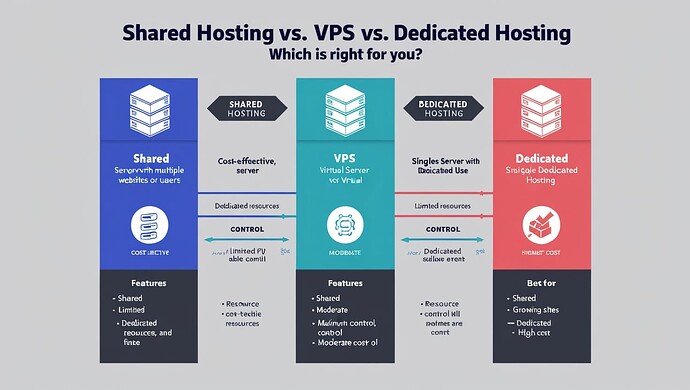When choosing a web hosting solution, understanding the differences between Shared Hosting, VPS Hosting, and Dedicated Hosting is crucial. Each type has its own set of features, benefits, and limitations. This post will help you navigate these options to find the best fit for your needs.
1. Shared Hosting
What is Shared Hosting? Shared hosting involves multiple websites sharing a single server’s resources, such as CPU, RAM, and storage. It’s the most common and cost-effective hosting option.
Pros:
- Affordability: Shared hosting is usually the least expensive option, making it ideal for individuals and small businesses.
- Ease of Use: Providers manage server maintenance and security, which simplifies the process for users.
- Convenience: Includes pre-installed software and one-click installations for popular applications like WordPress.
Cons:
- Resource Limitations: Since resources are shared, performance can be affected if other websites on the server experience high traffic or consume excessive resources.
- Limited Customization: You have less control over server settings and configurations.
- Potential Security Risks: Shared resources can lead to increased security vulnerabilities.
Best For:
- Small websites or blogs
- Beginners and those who prefer a low-maintenance solution
- Sites with low to moderate traffic
2. VPS Hosting
What is VPS Hosting? Virtual Private Server (VPS) hosting provides a virtualized server environment, where a physical server is divided into multiple virtual servers. Each VPS has its own allocated resources and operating system.
Pros:
- Dedicated Resources: Unlike shared hosting, you have dedicated CPU, RAM, and storage, leading to better performance.
- Increased Control: You have more control over your server environment, including custom configurations and software installations.
- Scalability: Easily scale resources up or down as needed.
Cons:
- Higher Cost: More expensive than shared hosting, though still cheaper than dedicated hosting.
- Technical Knowledge Required: Requires some level of technical expertise to manage and configure the server.
- Limited Resources: Resources are still shared among multiple virtual servers, so heavy usage by other VPSs can affect performance.
Best For:
- Growing websites with moderate to high traffic
- Businesses requiring more control and customization
- Users with some technical expertise or willingness to learn
3. Dedicated Hosting
What is Dedicated Hosting? Dedicated hosting provides an entire physical server solely for your website. You have full control over the server’s resources, configuration, and software.
Pros:
- Full Resource Availability: All server resources are dedicated to your website, providing optimal performance and reliability.
- Complete Control: Full access to server configurations, software installations, and security settings.
- Enhanced Security: Fewer security risks compared to shared or VPS hosting, as no other users share the server.
Cons:
- Cost: The most expensive hosting option, suitable for high-budget projects or large enterprises.
- Management Overhead: Requires significant technical knowledge or a managed hosting service to handle server maintenance and security.
- Scalability Challenges: Scaling resources typically requires server upgrades or migrations, which can be complex.
Best For:
- High-traffic websites or applications with demanding resource needs
- Businesses requiring maximum performance and security
- Users with advanced technical expertise or those willing to invest in managed services
Conclusion
Choosing between Shared Hosting, VPS Hosting, and Dedicated Hosting depends on your website’s needs, budget, and technical expertise. Shared hosting is ideal for small sites and beginners, VPS hosting offers a balance between cost and control for growing businesses, and dedicated hosting provides top performance and security for large-scale operations.
Evaluate your website’s requirements and consider future growth when making your decision. Each hosting type has its unique advantages, so selecting the right one will help ensure your site’s success and smooth operation.
